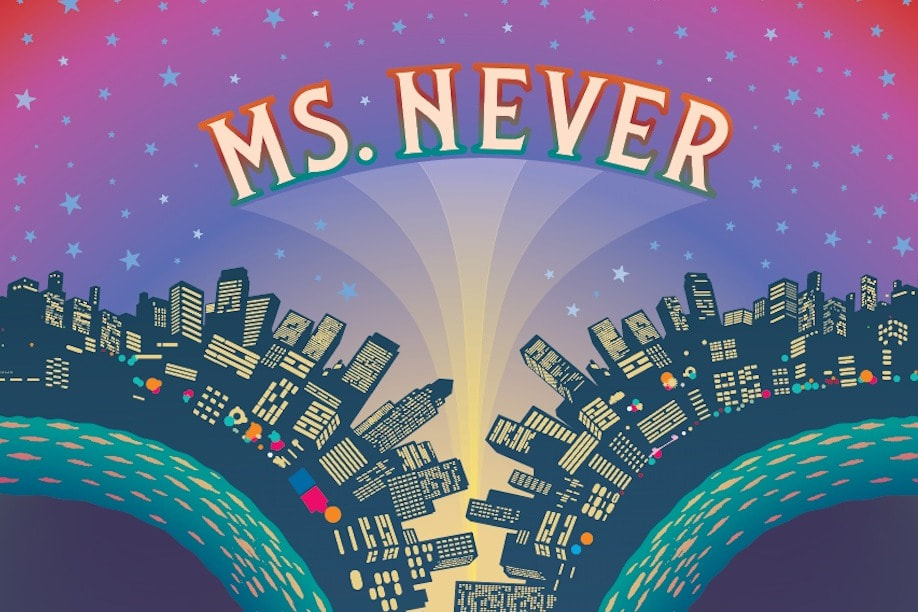Ms. Never, coming out in early November Farya Navurian seems like an ordinary young woman trying to get ahead in the city while struggling with depression. But her depression is anything but ordinary - it has the power to destroy time and space. Growing up the moody daughter of a space-faring hero of The Greater Anointed Imperial Ohioan Commonwealth, Farya annihilated most of that world and its history, leaving behind the husk-like Buckeye State. One day at a record swap, she meets Bryan, a divorced telecom CEO. More than record collecting, what they share is that they each carry a howling secret. Bryan’s business is a cover for a bigger operation that buys human souls and sells luxury afterlives using shady terms of service in mobile-phone contracts. The two of them fall in love, and as they start a life together, their secrets back them into a corner where they have to come clean - and take drastic steps - to save themselves, and possibly reality itself. CAROL SMALLWOOD INTERVIEWS NEW YORKER COLIN DODDSMs. Never by Colin Dodds 470 Pages, 5”X8” Paperback $18.18 Also available as an ebook and an audiobook Science Fiction, Literary Fiction Publication Date: November 1, 2019 ISBN: 978-1690788140 Contact: [email protected] More info at: thecolindodds.com https://www.amazon.com/dp/B07WNRNF8P?ref_=pe_3052080_276849420 https://www.gofundme.com/f/ms-never Smallwood: What is your literary background, education? When I grew up in Central Massachusetts, it was a place with a great emphasis on, and reverence for, literature. A lot of writers and comedians were kids in Massachusetts in the 1980s - disproportionate amount among just the people I knew growing up. It didn’t seem all that special at the time. But maybe it was. Massachusetts had a strong mix of the prigs and the hippies and they all agreed that whatever mattered, it was invisible. The whole world seems to have run screaming from that variety of inquiry and appreciation. Seems, anyway. Maybe that’s me being middle aged, or maybe that’s living in this particular iteration of New York. But the invisible important things are still there. Just try and prove me wrong. Anyway, I did the bulk of my grammar and high school education at Catholic institutions, which made me even more sensitive to metaphysics, as well as its bullying tactics where the ethereal rubber hit the road of our minds. From there, I fled to college in Southern California, where all of those dynamics - and the accompanying humor - simply didn’t exist. I barely lasted the school year, then moved to New York, where I finished my education at the New School. College in New York wasn’t a paradise, but I had the freedom to make my mistakes in a rotating cast of 8 million strangers. I got roughly what I deserved, and a degree to boot. The school, then The New School for Social Research, but The New School University the year after I graduated, had no campus to speak of. It was more of a placeholder, and I could take classes at Cooper Union and even NYU. It was good. I learned as much from the bad jobs, bartenders and strange folks in the East Village as I did from the classes. When I started there, I doubted I’d find anywhere I belonged. And by the end of school, I still hadn’t. But I left with the belief that I could. Smallwood: How did you ever manage to write your latest novel, Ms. Never, from the female viewpoint? The main character in Ms. Never, Farya Navurian, is prone to fits of depression that culminate in what she calls “seizures,” which annihilate enormous swaths of reality. The depression that brings on the seizure are, like any depression, somewhat manageable. The problem with depression, however, is that you need the wherewithal to do what you need to do to manage it - exercise, meditate, eat better, get out of the house and do something you enjoy, reach out to friends to talk. But, alas, depression robs you of that wherewithal. Depression has a way of making itself unmanageable. For anyone who is close to depressed people, this makes sympathy complicated and difficult. It seems like the depressed person is making up their own problems, or are childishly refusing to take obvious steps toward caring for themselves. Now, add in an element of depression which destroys physical reality to the point where millions of people alive now have never been born, dozens of millennia never happened and hundreds of cities were never built. Then sympathy for the depressed person becomes almost impossible. This impossibility of sympathy is something that Farya grapples with throughout the book. Farya the destroyer of worlds had to be a woman to be remotely sympathetic. I think that, even with the recent changes to what we all say and expect from the genders, that there are still some aspects of our common humanity that we find especially distasteful in men. That we are only nominally in control of how we feel, and only slightly more in command of our actions, is a fact that’s especially hard to accept in a male protagonist. And writing someone other than yourself is what fiction is all about. Smallwood: In what genre did you first begin writing—that is, nonfiction, poetry, or fiction and how old were you? I remember writing a story about a Godzilla-like dragon when I was seven. I really enjoyed that. Then I started again in high school, with some gory horror. Poems and more surreal fiction started sophomore year. Then it was off to the races. I wrote poems and short stories throughout high school and into college, where I wrote a few plays. Since then, I’ve written screenplays, novels, advertisements, and a whole lot of stuff that certainly wouldn’t burnish my dim reputation. But I’ve always written. Smallwood: How has living in different places influenced your writing? I’ve lived almost my entire adult life in New York City, after a short and turbulent period of traveling. When I do get out of town on vacation or for work, it’s always refreshing, always dilates the senses. There aren’t just a lot of places to live, but many ways to live. That’s always a tonic to remember. Living in different places hasn’t influenced my writing so much as it’s influenced me. Living in Massachusetts shaped my character on a basic level, made me willful and fairly earnest. Living in California cured me of wanting to live in California. Living in New York taught me the essentially mercantile values of being adaptable and clever, keeping possibilities open, and not taking failure or rejection very seriously. Smallwood: How has having positions beyond writing helped you as a writer? Of course, those jobs have helped me survive. But beyond that, they’ve exposed me to different kinds of people, to the dynamics that shape the world I live in, and allowed me to travel. Maybe the most valuable things those jobs have done is to force me to learn about things I wouldn’t have learned about otherwise, like business, finance, the law, government, public-relations and marketing. In college, I studied mysticism, literature, art and history. And I might have been content to mentally live in those worlds, if the threat of starvation and disgrace hadn’t driven me into the offices where I’ve spent so much of my adulthood. To be fair, I still argue privately about whether or not to be bitter. But for better or worse, being taken from that for eight to ten hours at a time to go to work has been deeply informative of my writing. In some ways, I think that’s made me a better writer. It’s not uncommon to read or watch something and ask about the main characters “but how do they make a living?” It’s a real weak spot for a lot of writers who have only ever worked as writers - they have no idea how anyone makes a living, or how those occupations shape and distort almost everyone’s personality in 21st century America, where most of what we do with our waking hours is work. Smallwood: Please tell readers about your poetry collection published by Main Street Rag Publishing Company: Spokes of an Uneven Wheel came out just about a year ago. It’s a collection that encompasses a wild few years of poetic work through the birth of my daughter. Main Street Rag had published my poems in their journal. And when they had an open reading period in ‘17, they accepted the collection not long after I sent it over. Once it was published, the book was a good chance to go out and do readings, and to connect with old friends in the poetry world. It was also an opportunity to go out and get some nice reviews. It’s a great book and everyone should buy a copy or at least read some of the poems in it, which they can for free here. To sum up the experience of having Spokes of an Uneven Wheel published, there was less than no money and little glory, but it got me back in touch with many kindred spirits. Smallwood: What are some magazines in which you have appeared? I’ve had poems, essays and short fiction appear in more than three hundred publications including Gothamist, Painted Bride Quarterly, and The Washington Post - but mostly in smaller journals. Smallwood: How did you manage to also write screenplays, direct a film, and work as a video producer? Videos, movies, poems, articles, infographics, podcasts, novels and essays - they’re all related by how they’re created. They all sink or swim the same questions: “What is the story?” “Why am I telling it?” “Is it believable?” “Is it new?” “Is it fun?” “Is it clear?” Testing the material - whatever it is - along these lines is the first commonality. The second is the dogged willingness to find and create solutions when the material fails those tests. The beauty is that neither of those two acts is something one can ever be quite good enough at - my words have forked no lightning. And that’s exciting. That excitement is the third thing they all have in common. I enjoy them all. Smallwood: I can see that being a journalist, editor, and copywriter would help a great deal in getting your work accepted. What are you working on now? What I write and where I write for a living hasn’t really done much to get me into the kind of favor-trading ecosystem that would help me get published. That’s all dumb luck, and more or less relentless submitting of my work. Aside from post-production on a short film, I am not working on a specific big project. I’m playing publicist, marketer, huckster, fundraiser, art director, social media manager, and public personality - as much as I can to get Ms. Never into the hands, eyes and minds of as many readers as I can. And I imagine that the successes and failures of this endeavor will inform what comes next. Other than that, I’m filling notebooks and watching the brush for signs of large, wild movements. More about Colin’s work at thecolindodds.com Carol Smallwood is a literary reader, judge, and interviewer. A recent book is Patterns: Moments in Time (Word Poetry, 2019).
0 Comments
Leave a Reply. |
ISSN 2369-8446
To bring joy to readers everywhere. Archives
June 2023
Categories
All
http://roxananastase.weebly.com/
|




